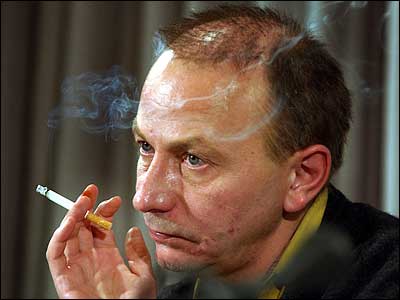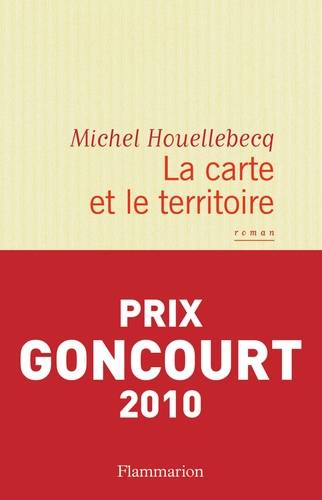26
Aug
Ben Jelloun hates even the gentler, kinder Houellebecq


Tahar Ben Jelloun, left, has initiated a literary feud with Michel Houellebecq.
WILL IT COST CONTROVERSIAL AUTHOR THE GONCOURT?
Publick Journal offers first look at Houellebecq’s new novel, La carte et le territoire.
© 2010 Publick Journal
26 AUGUST French Moroccan writer Tahar Ben Jelloun, a member of the Goncourt Academy which annually awards France’s most prestigious literary prize, has publicly denounced this year’s front-runner, novelist Michel Houellebecq, in an extraordinary move intended perhaps to foil–or at least spoil–the latter’s widely-anticipated win this November.
 In a piece published by the Italian newspaper La Repubblica last Thursday under the title “The Houellebecq Case," Ben Jelloun pronounces harshly against Houellebecq’s latest novel even before it is published, accusing it of both excessive self-regard and self-pity. La carte et le territoire (a word-play best translated asThe Map IS the Territory in English, reversing Korzybski’s dictum on general semantics), will be released next month in France by Flammarion.
In a piece published by the Italian newspaper La Repubblica last Thursday under the title “The Houellebecq Case," Ben Jelloun pronounces harshly against Houellebecq’s latest novel even before it is published, accusing it of both excessive self-regard and self-pity. La carte et le territoire (a word-play best translated asThe Map IS the Territory in English, reversing Korzybski’s dictum on general semantics), will be released next month in France by Flammarion.
Mocking the literary conceit of fictionalizing oneself in the pages of one’s own novel, Ben Jelloun writes, "Michel Houellebecq speaks of himself self-referentially as an important author, published throughout the world, unloved by critics and above all misunderstood by his own time.”
The novel had won early praise for adopting a more self-deprecating, and less scurrilous, posture, while still maintaining the author’s ironically melancholy tone. Houellebecq’s previous candidates for the prize, The Elementary Particles (1998, known as Atomised in the U.K.) and The Possibility of an Island (2005) enjoyed both popular and critical success but went conspicuously unrewarded by the Goncourt jury, whose own relevance has been questioned in turn by Houellebecq’s supporters.
In the piece Ben Jelloun reveals much of the book’s story line. A lonely painter-photographer (and Michelin map artist) named Jed Martin befriends “Houellebecq” after enlisting the “world famous” author to write a preface for an exhibition catalog. The two share unhappy upbringings, broken relationships, and accidental celebrity. Martin’s mother committed suicide early on; his father is an architect of some renown who after struggling through life also ends up a suicide. (Houellebecq’s much publicized relationship with his own mother, in both its literary and extra-literary forms, is extremely damaged of course.) As with Houellebecq’s other novels, the temporal perspective shifts from chapter to chapter, retreating one moment into the past and projecting the next into the near future without ever quite leaving the present.
owever shaky, this fictional premise gives Houellebecq enough ground and cover to unleash his scandalous pronouncements onthe world–particularly the world of painters and architects–more or less in propria persona.
Thus Picasso
paints a world hideously deformed, because his soul is hideous, and that is all there is to say with Picasso; there’s no reason to encourage the exhibitions of his paintings any further, he has nothing to offer; there’s no light in him, no innovation in the organization of colors or of forms; in sum, there’s absolutely nothing in Picasso that deserves to be singled out other than an extreme stupidity and a priapic smearing that may seduce certain sexagenarians with fat bank accounts.
Equally defamed is Le Corbusier as “a totalitarian and brutal spirit, animated by an intense taste for ugliness” who tirelessly builds “concentrationary spaces, divided into identical cells, acceptable precisely […] for model prisons.”
Not all is singled out for execration, however. Houellebecq writes favorably for example about a number of consumer brands, a practice that readers of Murakami and Houellebecq’s earlier works will certainly recognize but which seems to surprise and even to enrage Ben Jelloun, who likens the book to an athlete’s jersey patchworked from various sponsor ads.
Perhaps the worst that can be said about this is that Houellebecq’s tastes run boringly bourgeois. Ben Jelloun mentions Houellebecq’s admiration for Audi, Mercedes (not the S-class but the “A- and C-classes”), even the nouveau riche Lexus. Also mentioned by name are such celebrity brands as “Philippe Sollers” (who had previously made a riotous appearance in Houellebecq’s Elementary Particles), “Damien Hirst,” “Jeff Koons,” “Steve Jobs,” and “Bill Gates,” the subjects of Jed Martin’s photographic portraits.
More obscure to non-French readers will be a number of Gallic names, including that of Jean-Pierre Pernaut, who outside of France, as Ben Jelloun rightly but indelicately notes, “is totally unknown.” A long-time news reader for the TF1 network, Pernaut outs himself on air as a homosexual in Houellebecq’s fantasy, although the actual Pernaut has done no such thing and is unlikely ever to do so. (A father of two grown children, Pernaut married a former Miss France in 2007 with whom he has two more offspring.)
The invention is outrageous enough to undo itself. It is precisely on account of Pernaut’s enigmatic sereneness–to the nervous writer his calmness is provocative–that Houellebecq would like to imagine him capable of such a stunt:
Departing from the immediate event–violent, fast, frenzied, deranged–Jean Pierre Pernaut would accomplish every day that messianic task which consists in guiding the viewer, terrorized and distressed, towards the idyllic regions of a preserved countryside, where man once lived in harmony with nature, according to the rhythm of the seasons.
Much will be made of Houellebecq’s commentary in these pages on the troubled relationship between the persona and the person, fiction and reality, the “map” and the “territory.” Even France itself, the France profonde of the terroir and the sol and the sous-sol, seems an artificial paradise, just another map drawn for the tourists. As others have noted, in today’s “fake it till you make it” reality-show society, self-fictionalization is a practice in which every teen with a blog or facebook account actively engages. It’s not just for world-weary novelists anymore.
Such a ubiquitous theme and practice could never be of much interest anyway, particularly when so self-consciously addressed. Houellebecq’s less complete self-fictionalizations in his previous works are more telling for that reason, as are the writings, for example, of the intensely reserved W.G. Sebald, who also manages to inscribe himself in texts that dissolve the line between fiction and history by a simultaneous expansion, as it were, of both spheres, not of one at the expense of the other. Houellebecq’s treatment of the subject is farcical, at once self-inflating and self-deflating. It seems to expand our views on little, other than Houellebecq’s endless loneliness and crushing depression.
It is perhaps unkind to say, but Houellebecq is at his strongest when he is at his cruelest, that is to say, his funniest. There is more than a passing resemblance in this respect to Thomas Bernhard (particularly in Old Masters), also known to insert his persona, if not himself, into his works, and to plot his narratives around the course of male friendship, particularly between slightly unequal artistic geniuses. Unfortunately, Picasso and Le Corbusier (or for that matter, Jean-Pierre Pernaut and all the other minor French celebrities including the one that Houellebecq himself has become) make easy and unoriginal targets.
Indeed, the popular disparagement of Le Corbusier had already begun well before the French banlieues riots of 2005, when everyone pointed a finger at the putatively “dehumanizing” effects of the brutalist public housing buildings, those massive concrete blocks that were designed and advocated by the celebrated architect.
As for Picasso, leave it to his family, friends and lovers and to Picasso himself to say much worse about the man. The passage from Houellebecq cited as particularly odious by the slightly out-of-touch Ben Joullen, who seems insensible of Houellebecq’s qualities, is remarkable only for the irony that everything that is said of the painter could apply, mutatis mutandis, to the writer Houellebecq himself, as he should well know.
To call La carte et le territoire a lighter and funnier work, as some have done, is to mistake the source of Houellebecq’s humour, which needs the darkness to flash its light. Still, the gentler and kinder tone does make the book considerably more appealing to the Goncourt Academicians, who have been quite happy not to hand over their prize to someone formally accused of inciting “racial hatred” (for calling Islam “la religion la plus con” in 2001, around the time of publication of his novel, Platform). The journalist Pierre Assouline has gone so far as to speculate that Houellebecq himself might have deliberately toned things down this time to write a book that has “everything to please them.”
Faced with the jury-friendlier Houellebecq, Ben Joullen could no longer swallow his vomit. If Houellebecq is a dish that one finds, according to taste, delicious or disgusting, Ben Joullen seems bent on spoiling it for everyone. Among the book’s secrets broadcast by Ben Joullen was one that the publisher had taken particular pains to keep under wraps as long as possible, namely that “Houellebecq” is violently murdered in the book (albeit in the year 2016) . Buried among the literary stars at Montparnasse, his harrowed remains are visited by hundreds of faithful readers. “All declared themselves ‘shocked’ or at least 'profoundly saddened’ and honor the memory of an immense artist who will always be present in our memories …’”
The investigation that follows the discovery of the mutilated body gives the book, to one’s surprise, something of a mystery thriller’s narrative drive. “It is impossible to write a novel,” Houellebecq writes on page 179 of his novel, “because it is impossible to live.” Only by killing himself can he begin to write again, and perhaps even to live.
It’s too early to say if Ben Jelloun can sway the rest of the jury and lead a successful campaign against Houellebecq, who also has supporters in the Academy, the most vocal of whom has been none other than Bernard Pivot (who knows a thing or two about being a literary celebrity). In any case, Houellebecq has written an astonishing and beautiful book as worthy as any in recent memory of France’s top literary prize. Unfortunately, that book was The Elementary Particles 12 years ago, and it may take a small injustice now, at least in the eyes of Ben Jelloun and the other anti-Houellebecquiens, to make up for the larger one back then.
 lonnailumckinni-blog liked this
lonnailumckinni-blog liked this  angelynnbackman-blog liked this
angelynnbackman-blog liked this  doreneoksansone-blog liked this
doreneoksansone-blog liked this publickjournal-blog posted this